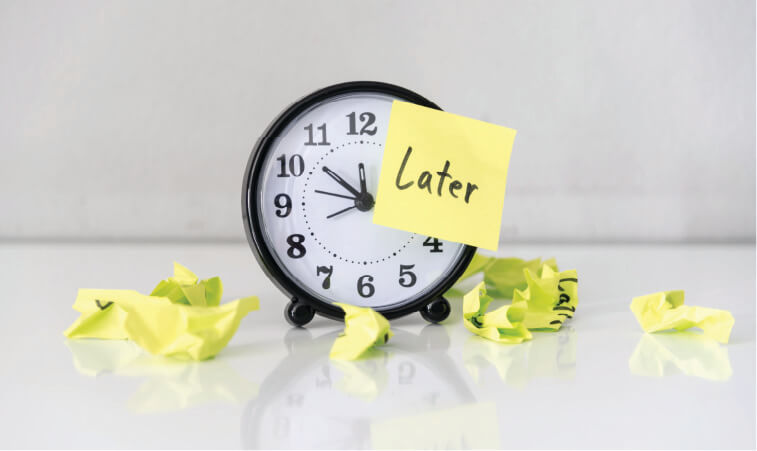We’ve all found ourselves procrastinating occasionally – who hasn’t watched just one more episode on Netflix instead of tackling that pile of laundry? However, if procrastination becomes a regular habit in your daily life, persistently interfering with your productivity and well-being, you might find yourself wondering: Could this be a symptom of something more?
If your procrastination doesn’t feel like a choice but rather an inability to initiate tasks or manage your time efficiently, it could be a sign of ADHD. This neurodevelopmental disorder is often characterized by inattention, hyperactivity, and impulsivity.
In this article, we’ll explore the relationship between ADHD and procrastination, shedding light on this often misunderstood symptom. We’ll also discuss how to differentiate between typical procrastination and ADHD-related procrastination and the steps you can take if you suspect you might be dealing with the latter.
The providers on Klarity are licensed and certified to provide professional ADHD diagnoses. In as little as 48 hours you can have a virtual appointment and learn if your procrastination is simply that or if it’s ADHD.
To find out if your procrastination is a sign of ADHD, take our 2-minute self evaluation online today.
Overview of Adult ADHD
Adult attention deficit hyperactivity disorder (ADHD) is a neurodevelopmental disorder characterized by a persistent pattern of inattention, hyperactivity, chronic procrastination, and/or impulsivity that interferes with and impacts work, home life, and relationships – especially if left untreated. While long considered a disorder that started in childhood, it is now recognized as a lifelong condition that persists well into adulthood.
Normal Procrastination
Normal procrastination is choosing not to get around to something in a timely manner. This temporary condition can be due to a number of factors, including fear or anxiety, higher priorities, misunderstanding of urgency, not being prepared, or reluctance to do the task. Everyone, at some point, for some reason, finds themselves procrastinating.
Noticing symptoms and suspect you have a mental health condition? Take a free self-evaluation on Klarity today.
ADHD Procrastination
ADHD procrastination is a far more serious matter and may completely stall any progress toward completing a task. Procrastination is an avoidance behavior and not an officially documented ADHD symptom.
However, imbalances in motivation can occur in people with ADHD, which can lead to procrastination as they tend to hyperfocus on tasks they deem interesting but procrastinate tasks they deem tedious. This procrastination, because it’s related to symptoms of ADHD, can become chronic.
Tips for Combating ADHD Procrastination
If ADHD is the source of your procrastination, there are evidence-based strategies that can help you manage the thought patterns underlying your work avoidance and develop concrete strategies for meeting your work (and life) goals.
Remove Distractions
As an adult with ADHD, it’s easy to get derailed by internal and external distractions. You may even find yourself using these distractions to avoid a task. Removing distractions involves taking steps such as using site blockers on the Internet to help focus, turning off your phone and email notifications, and taking care of personal issues before getting started on a task.
Get Organized
Organization is key to avoiding ADHD procrastination. While there may be many tasks on your list of things to do, a great way to start is to prioritize these tasks in a way that makes sense to you. Then, break up the task (which we’ll cover more later), organize the tools, resources, and other supplies you’ll need to do the task, do your best to estimate how long it will take, set a timeline for the task, then begin! The first step is just to get started; from there, you’ll be able to organize your task in a way that’s best for you.
Set an Early Deadline
It’s no secret; if time isn’t an issue, it’ll make procrastination far more likely. In addition, effective time management can be extremely difficult with ADHD. Even if your task doesn’t have a deadline, setting a deadline will keep you on track to complete it. Setting an early deadline allows you to complete a task in a timely manner.
Break Up Larger Tasks
Big projects can often feel overwhelming, and when you’re overwhelmed by the size of the task it’s far harder to start. To make things easier, try breaking up large tasks into smaller, more realistic chunks. Write out the tasks required for each job and tackle them as individual jobs, each with its own separate deadline.
Create and Use Lists
Lists can help you visualize what steps to take and allow you to record progress in completing tasks and moving through your day. Break down each day’s list of tasks and responsibilities by the hour and allot a timeframe for each. Time management and creating lists can be invaluable for structuring your day’s activities, staying on task, and sidestepping procrastination.
Avoid Multitasking
Thinking you have to complete many tasks at once can make starting on any one of them daunting. Streamline your workload by sticking to a process of doing one thing at a time rather than trying to tackle multiple tasks simultaneously. Avoiding multitasking can help you maintain your focus as well as your concentration.
Tackle the Hardest Part First
Sometimes the hardest part of completing a task is just taking the first step – other times, another part of the process is the most challenging. Rather than trying to get yourself to get through a project and all the while dreading the difficulty to come, try tackling the hardest part first and get it out of the way. After that, the rest is far easier to work on and complete.
Take Exercise Breaks
Stepping away for a bit and clearing your mind can be extremely beneficial. Besides being great for your health, taking a short break for walking, stretching, or exercising is a great way to jumpstart your thought process. If you’re having trouble getting started, exercise is a great way to jumpstart your energy so that you can return to the task at hand feeling renewed.
Reward Yourself
People without ADHD tend to encounter less trouble with procrastination because their brain naturally rewards them when they work on tasks – even doing the dishes can feel good. Without this natural tendency, it’s helpful to give yourself a small reward after the competition of tasks. This could be anything from a short nap, a hot bath, or a leisurely stroll in the park.
Do You Suspect You Have Adult ADHD?
If you find yourself struggling to complete tasks that your peers have no problem tackling, and your procrastination is unmanageable, you may have adult ADHD. The good news is that you can get a judgment-free evaluation, a diagnosis, and a treatment plan all from the comfort of your home.
Schedule an Online Examination with a Licensed Professional
Don’t procrastinate! Contact Klarity today to schedule your online examination with one of our licensed professionals. We can help you live with, manage, and ultimately take control of your adult ADHD. Take this free 2-minute self-evaluation to learn if you’re a good fit for Klarity’s service.







